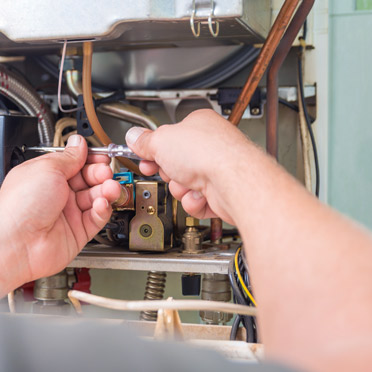Mini-Split Repair

Heat Repair Causes
Your heater may have failed (and needs repairs) due to the following reasons:
Faulty Thermostat – A thermostat on its last legs will keep glitching until it finally dies. This includes frequent temperature misreadings, which will lead to inefficient heating. A faulty thermostat is also likely to cause your HVAC unit to short-cycle. If replacing the batteries doesn’t help, there may be loose connections or parts. If the thermostat won’t turn on, a blown fuse may be to blame. Either way, you need repairs or part replacements ASAP to get your heater running again.
Failed Fan – The main role of an HVAC fan is to blow out and circulate heated (or cooled) air. If this gets damaged or loose, it won’t properly push air out of the vents or ducts. Dirt and debris build-up on fan blades also lead to inadequate heating.
Damaged Blower Motor – For the fan to work in the first place, the blower motor should be supplying it with power. So if your heater’s motor dies, the fan won’t rotate and no heated air will come out of the unit. Blower motors often fail due to corrosion, which poor venting and ductwork can cause. Condensation, which is common in air conditioners, can also spread to your heater. When moisture enters the heater, oxidation can occur within the motor. An overloaded (and tripped) circuit breaker can also overheat your heater’s motor. Shot bearings may also cause motor failure.
Broken Belt – Some HVAC units have a belt-driven motor that transfers rotational energy to the fan. This energy then powers the fan and makes it move to blow out heated or cooled air. For the belt to transfer enough energy to the motor though, it needs to have proper tension. HVAC belts can become slack over time, due to age and damage, or because of dirt build-up. Incorrect tension can then overstress the belt, further speeding up its degradation. It won’t take long before this cracks and snaps the belt. Once the belt breaks, you need to have it replaced ASAP. Otherwise, your HVAC unit’s motor won’t be able to move the fan to circulate heated air. If you smell burning rubber, turn off your HVAC unit and call a heating and air repair specialist right away. This smell is likely from an overstressed or broken belt. The friction can damage not only the belt but also other key parts like the motor and fan.
Cracked Heat Exchanger – A heat exchanger either heats the air in a furnace or the water in a boiler. It does so by burning natural gas, liquefied petroleum gas (LPG), and other heating oils. As the heat exchanger burns these energy sources, it also creates combustion gases. At the same time, it keeps these gases trapped inside to prevent gas leaks. These gases include carbon dioxide (CO2), carbon monoxide (CO), and nitrous oxide (NO). Over time, the heat exchanger will develop stress cracks and other damages. After all, the exchanger contains metal components that expand and contract with heat. After many years of doing this, these metals will wear away. When this happens, all those combustion gases can leak and contaminate the air in your home. Either way, these gases are harmful and could even kill. CO poisoning alone lands some 50,000 people in emergency rooms every year. Worse, it claims at least 430 lives each year. If your heater suddenly dies and your house smells like a funeral home, leave right away. A formaldehyde-like smell is a solid indicator that you have a cracked heat exchanger. If this occurs, give us a call 24/7 so we can dispatch an HVAC technician to your home for immediate heating repairs.

Peace of mind for you and your family.
Efficient Energy Systems has over 45 years of experience in the HVAC service industry. Fully licensed and insured.

